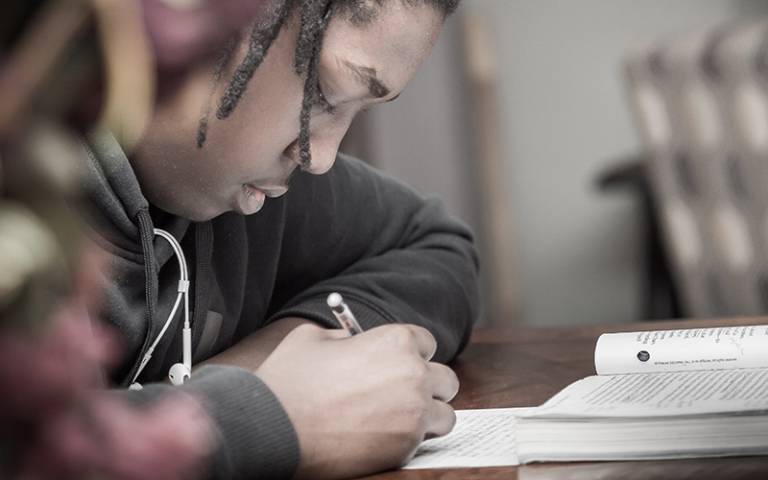Young people showed resilience and adaptive coping strategies emerging from the Covid-19 pandemic
12 May 2023
While challenging Black and mixed ethnic young people’s mental health, pandemic experiences helped develop positive responses to adversity, reports new research by BSc alumna from IOE, UCL’s Faculty of Education and Society.

The study, published in BMJ Open, reports the findings of Psychology with Education BSc alumna Romane Lenoir’s dissertation work which listened to the experiences of young people to uncover the effect of the COVID-19 pandemic and associated lockdowns on their mental health, wellbeing, and social lives, how this changed since the end of lockdown, and asked what support they thought would help them to better cope with the resulting issues.
The study was conducted as part of the ‘COVID19: Co-creating psychological wellbeing and life-skill workshops with BAME youths in West London’ (COPE-WELL) study, in collaboration with the study’s knowledge exchange partner, Jamal Edwards Delve (JEDelve) Charity.
The UKRI-funded COPE-WELL study led by Dr Keri Wong, aimed to understand the impact of the COVID-19 pandemic on young people from Black and mixed ethnic backgrounds and to co-create appropriate life-skill and mental health workshops to enable them to better cope with the impacts of the pandemic. Romane’s paper documents the ‘listening’ period of this co-production process, the findings of which went on to inform and shape five workshops.
Romane conducted qualitative one-on-one interviews with ten young people aged between 12-17 years old who attended a community centre in West London. The interviews found that feelings of loneliness and isolation were the most common experience that challenged the young people’s mental wellbeing.
One participant, aged 16, said: “you can have like a million people around you and still feel alone. So I felt like in that moment I felt so alone and…tired and mentally exhausted (…) But I feel like everybody was more out for themselves and not really trying to really help each other (…)… I feel like the community was kind of broken.”
As a result of being required to stay indoors, 30% of participants described suffering from decreased self-esteem, with underlying insecurities manifesting themselves through self-doubt and low confidence. They commented on the impact of the lockdowns on their social lives, finding both positive and negative outcomes from the experience: “I found true friends and I also lost people that I thought were good friends to me” (age 16).
70% of the young people complained of a lack of support during the COVID-19 pandemic and wished for more support moving forward, the largest being psychological support (50%), followed by 40% who wanted more relational support in response to social bonds having been challenged.
Being left alone with their thoughts led some young people to be more introspective; half of the participants reported observing growth in themselves, with 30% citing a variety of autonomous adaptive coping skills which they could recognise as playing a part in strengthening their personal and mental resilience in the face of adversity.
Another participant, age 15, said: “I think it strengthened my relationships but it also strengthened the relationship that I had with myself which is like one of the most important one.”
Overall, the study highlights the importance of addressing the psychological wellbeing of BAME young people, who are often at greater risk of experiencing poor mental health outcomes and are not heard in the literature. The results of this study suggest that providing these young people with the tools and resources they need to cope with stress and anxiety will have a significant positive impact on their overall wellbeing.
Romane said: “By giving voice to communities less heard from, we hope to inspire larger-scale research and develop tailored mental health support for Black and mixed ethnic minority communities.”
Dr Wong, COPE-WELL Principle Investigator and Romane’s dissertation supervisor, said: “This project brings to light voices of young people from minority ethnic backgrounds, whose experiences are underrepresented in both the academic literature and media, and how researchers provide a safe space to listen and support their needs. Specifically, this paper evidences the struggles young people from minority ethnic backgrounds faced during the pandemic (e.g., loneliness, mental health, body image, lack of motivation), but also highlights their incredible resilience when faced with such hardship a year on from lockdown easing (e.g. personal growth, freedom, developed coping mechanisms).”
The Cope-Well study has informed an additional UKRI-funded knowledge exchange project at IOE, called Empower-Islington, aiming to reach an even larger group of ethnic minority young people aged 16-25 years living within Islington Council.
Links
- Read the full paper in BMJ Open
- COPE-WELL study
- Empower-Islington
- Psychology with Education BSc
- Q&A with Dr Keri Wong
- Dr Keri Wong’s academic profile
- Centre for Education and Criminal Justice
- Department of Psychology and Human Development
Image
Wadi Lissa via Unsplash.
 Close
Close

